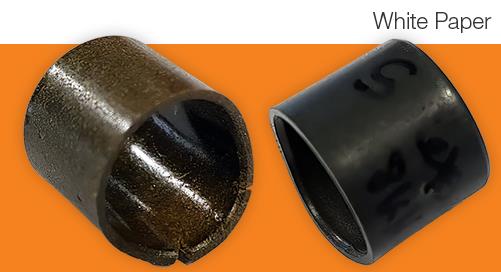What are the Differences Between Simple and Engineered Plastics?
 Customers often ask us, “What makes an engineered composite plastic different than a simple plastic?”
Customers often ask us, “What makes an engineered composite plastic different than a simple plastic?”
In some cases, a simple plastic would be suitable; however, for challenging applications where loads, chemicals, speeds, or other factors are present, engineers should consider an engineered composite plastic that will withstand these conditions while providing long service life. In regard to bearings, engineered composite plastics offer quite a few advantages over simple plastics, and even traditional metallic bearings. Let’s take a look at some of the differences below.
Simple Plastics are More than Just “Simple”
Simple plastics are an excellent bearing material choice when trying to eliminate metal-on-metal contact for certain applications. Some common simple plastics that are used when manufacturing bearings include POM, PEEK and UHMW to name a few, and often, these bearings are produced at a local injection molder or are machined from plate or bar stock.
Below are some of the advantages provided by simple plastic bearings:
- Absence of corrosion within a bearing assembly.
- Increased lifetime by a decrease in the wear between two metal surfaces.
- Elimination of high replacement costs for a shaft or housing due to premature wear.
- Low-noise operation due to less metal-on-metal contact.
Tribologically-Optimized Composite Plastics Take Things to the Next Level
Most engineered composite plastics are self-lubricating, maintenance-free, and typically offer numerous advantages over simple plastics when used within heavy industrial applications. Each composite plastic manufacturer has a unique formula that classifies the bearing type and determines the mechanical properties it offers—for example, igus® manufacturers an engineered composite plastic material known as iglide®. Over time, this composite plastic formula has spawned additional formulas to produce an all-encompassing range of iglide® plastic materials that can be used to manufacture bearings, along with other industrial components. Tribologically-optimized iglide® bearings are comprised of three main components that work together to create wear-resistant bearings which do not require any external lubrication, allowing for a completely maintenance-free system. These three components are:
- Base polymers
- Fibers and/or filaments
- Solid lubricants
Now, let’s take a look at what each one can offer your application:
- Base polymers: As we discussed above when speaking about simple plastics, base polymers decrease the amount of wear for bearings and increase the overall service lifetime. Each iglide material starts out as a base polymer or simple plastic.
- Fibers and/or filaments: These act as reinforcing compounds and help to strengthen the bearing so that it can withstand load forces. There is a range of different fibers and/or filaments that can be used, and since the length of these compounds can vary, each can have a different effect on the bearing.
- Solid Lubricants: These are meant to reduce the amount of friction within the system. Solid lubricants eliminate the need for messy external lubrication and maintenance, therefore avoiding potential costly downtime due to improper lubrication.
Composite bearings are typically homogeneously-blended, meaning that the entire bearing is a wear surface, and all three components mentioned above are embedded throughout the assembly. 
Putting it all Together, Without the Need for Grease
Composite plastic bearings have bolstered countless innovations within industrial environments that do not permit the use of harmful, external lubricants—clean room, food and beverage manufacturing, and the medical sector—along with environments where dirt and debris would usually attract to messy lubricants, causing premature wear within the assembly. Additionally, this has enabled engineers to avoid potential downtimes that would usually come with high costs. Both simple and composite plastics offer advantages when used within bearing applications, and although they each offer benefits over their metallic counterparts, composite plastics are able to handle more challenging and difficult industrial applications.
Interested in tribologically-optimized composite plastic bearings from igus®? Reach out to Nicole Lang, iglide® Product Manager, by emailing nlang@igus.net. Or, visit us at https://www.igus.com/info/plain-plastic-bearings.



